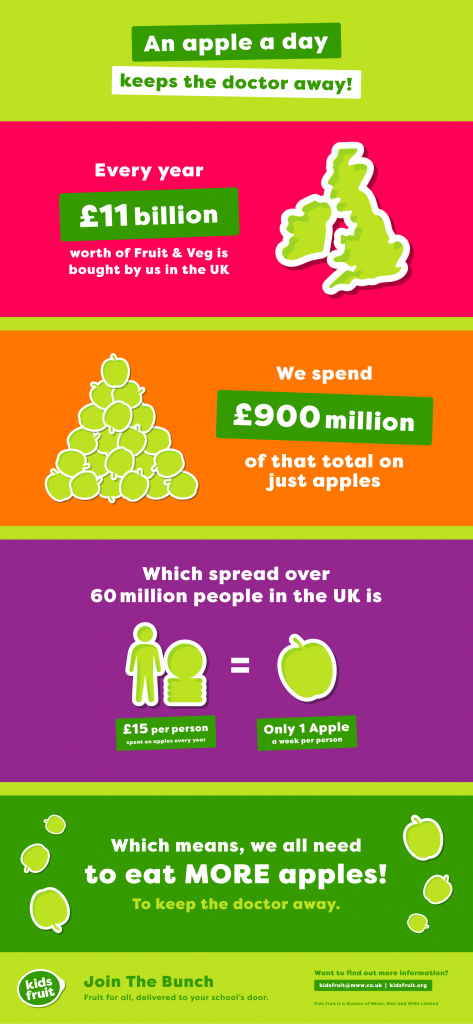Fun Facts
- There are more than 8,000 varieties of apple worldwide. This is the largest number of any fruit to exist.
- Apples are grown on trees in fields called orchards.
- Some apple trees can live up to 100 years.
- Apple trees are between 1.8 – 4.6 metres tall. That is up to 2 and a half times taller than the average adult!
- Apples float in water as they are 25% air, without this you wouldn’t be able to do any apply bobbing at Halloween!
Where do we come from?
Apples are grown all over the world, at different times of the year. This means that we are able to supply you with apples all-year-round, but they come from different places depending on when you are eating them!
In the UK apple harvesting takes place from the end of August to early October. The biggest growing area in the UK is Kent, supported by the East of England. Apples also grow in Worcestershire, Herefordshire, Warwickshire, Suffolk and Hampshire. Other countries in Europe also grow apples at the same time of the year as the UK. The 3 biggest growers in Europe are Poland, Italy and France closely followed by Germany, Holland, Spain, Portugal and Greece.
From April to Mid-October we source apples from the Southern Hemisphere, in countries such as South Africa, Brazil, Chile, Argentina, Uruguay and New Zealand.
Test yourself! Can you locate all of these countries on the map?

Growing Conditions
Apples need specific conditions, in order for trees to flourish and produce ripe and juicy fruit. These conditions are individual to each type of fruit and vegetable, and they are very important for farmers.
- Full sunlight
- Well-drained, loamy soil
- Neutral soil – pH 6.0-7.0
- At least 60 cm of soil
In the UK, apple trees grow best when they are planted from late autumn to early springtime.
Our Journey
- Apple trees are grown in fields called orchards.
- When the apples are ready the are harvest by teams of trained pickers.
- The apples are then loaded into wooden crates and taken to a nearby packing facility.
- On arrival, the apples are washed to remove any unwanted dirt and all rotten apples are removed.
- The apples are stored in temperature-controlled rooms until they can be sorted.
- Each crate of apples is given a bar-code so that they can be tracked throughout the process.
- Apples are sorted by smart machines, to make sure only the best and tastiest apples make it to the shops.
- The apples are then packed and labelled.
- One last check is carried out by the packer, to make sure that all bad apples have been removed and thrown away.
- The packed apples are loaded into chilled transport vehicles and sent to the shops, where they are unloaded and put on the shelves for you to buy

Are you eating enough apples?
We are good for you!
Apples help look after your body! They are high in both fibre and water which are very important for everyday bodily functions. They also contain lots of Vitamin C, Potassium and Vitamin K.
- Vitamin C is good for maintaining healthy skin, blood and bones.
- Vitamin K helps the body in its ability to heal wounds.
Well, you know what they say: an apple a day keeps the doctor away!
Did you know …
… Apples can help improve your memory, as they contain high levels of boron which stimulates electrical activity of the brain and increases mental alertness.
Quiz Question: How many famous apples can you name?
Apples appear all the time in different stories across history, in fairy tales and in everyday life. How many can you name? Here are a few to get you started …
Snow White’s poisoned apple.
Adam and Eve’s stolen apple.
Isaac Newton’s gravity apple.
New York City is often referred to as ‘the big apple’
Get Cooking: Homemade Apple Crumble

This dessert will definitely get everyone smiling! Click here for the recipe.